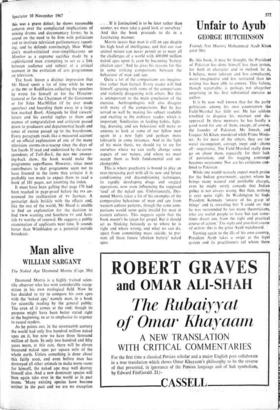Man alive
WILLIAM SARGANT
The Naked Ape Desmond Morris (Cape 30s)
Desmond Morris is a highly trained scien- tific observer who has won considerable recog- nition in his own zoological field. Now he has decided to try to compare his own apes with the 'naked ape,' namely man, in a book for scientific reading by the general public. The crux of it comes at the end; though its purpose might have been better stated right at the beginning, so as to emphasise its urgency to casual readers.
As he points out, in the seventeenth century the world had only five hundred million naked apes on it, but now we have three thousand 'million of them. In only two hundred and fifty years more, at this rate, there will be eleven 'thousand naked apes per square mile of the whole earth. Unless something is done about this fairly soon, and even before man has destroyed all other animals to make more room for himself, the naked ape may well destroy himself also. And a new dominant species will Ithen again take over in the world as in past -*eons. 'Many existing species have become extinct in the past and we are no exception . . . If it [extinction] is to be later rather than sooner, we must take a good look at ourselves.' And this the book proceeds to do in a fascinating manner.
Morris insists that man is still an ape despite his high level of intelligence, and that our raw animal nature can never permit us to meet all the challenges of a world with 400,000 million naked apes upon it, even by becoming 'battery chicken apes.' And he gives his reasons for this in some striking comparisons between the behaviour of man and ape.
Quite a lot of the comparisons are imagina- tive rather than factual. Every reader will find himself agreeing with some of the comparisons and violently disagreeing with others. But this is unimportant to the main conclusion of the exercise. Anthropologists will also disagree with many of the comparisons. But he has served us well by making his subject readable and exciting to the ordinary reader, which is important. Similarities in feeding habits, fight- ing, dressing, and sex behaviour will make us anxious to look at some of our fellow men again in a new light and perhaps more tolerantly in some instances. And in the light of his main thesis, we should try to see for ourselves where we can really change some aspects of our nature, and where we must accept them as both fundamental and un- changeable.
This is where psychiatry is bound to play an ever-increasing part with all its new and future conditioning and deconditioning techniques, its rapidly developing drugs and surgical operations, now even influencing the supposed 'soul' of the naked ape. Unfortunately, Des- mond Morris takes a lot of his examples of the comparative behaviour of man and ape from western culture patterns, though the same com- parisons would seem quite invalid for man in eastern cultures. This suggests again that the book mustn't be taken for gospel. But it should set us thinking furiously as to where he is right and where wrong, and what we can do, apart from committing mass suicide, to pre- vent all those future 'chicken battery' naked apes.






































 Previous page
Previous page